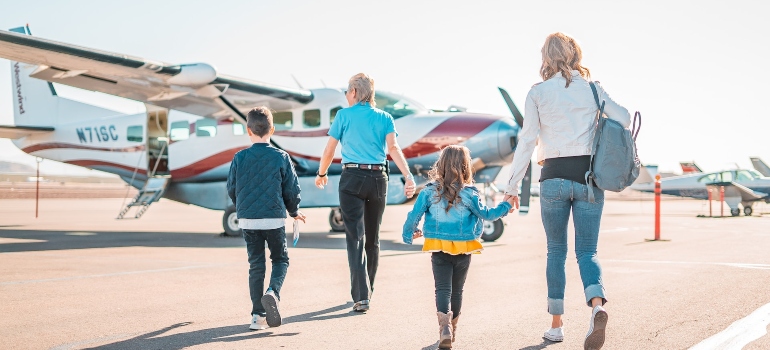Moving as a family is a big step, especially when you’re considering a different country. At Verified Movers, we get it; you’re not just packing boxes but transporting lives. This idea becomes more complex when kids are involved. So, what can you expect when moving abroad as a family?
Reasons Families Choose to Move Abroad
People pack up and move overseas for various reasons:
- Job Opportunities: Often, a parent has a job offer that’s too good to pass up.
- Quality of Life: Better weather, cleaner air, or safer neighborhoods.
- Educational Choices: Some countries offer better schooling for children.
- Cultural Experience: Living in a new culture can enrich your family’s life.
Now, you’re likely excited but also anxious. That’s completely normal!

Challenges of Relocating to Another Country as a Family
Nothing good comes without challenges – and moving is no different. But luckily, with proper preparation, these challenges can be easily overcome.
Emotional stress and adaptation
Moving is more than packing and hiring a truck. This is about handling emotions. For instance, kids might feel anxious about leaving their friends. According to a study by the American Psychological Association, children can experience stress levels similar to adults when moving. It’s not just about saying goodbye. You’ll also need to adapt to a new culture. Imagine needing to understand new holidays, different school rituals, or even varied dining customs. The process is a lot to digest.
Communication difficulties and time zone differences
Navigating communication barriers and grappling with time zone differences can add a layer of complexity to moving abroad as a family. Imagine trying to set up your new home and needing to call customer service for your internet or utilities, only to find that you don’t speak the language well enough to get your issues resolved. Or consider having to make international calls to relatives or financial advisors back home, but the time zone gap makes it nearly impossible to find a convenient time for both parties. These challenges can be particularly vexing in the first few weeks after you’ve moved and are still getting your bearings.
On a related note, ensuring that you store electronics safely after a move is vital, especially since you’ll be relying on them heavily for communication. Proper storage can prevent damage that might further complicate your adjustment period. While these challenges may seem intimidating, they’re not insurmountable. Many people successfully adapt by taking language courses or using translation apps for better communication. As for time zone issues, scheduling regular times for calls can help, as can making use of recording features to share important updates. These challenges do require some extra planning and flexibility, but with the right tools and approach, they can be overcome.
Legal and logistical issues
You’ve got papers to fill, legal boxes to tick, and logistical hurdles to clear. One out of every 30 people in the world is living outside their country of birth, according to the United Nations. That’s millions of people sorting out visas, residency permits, and school applications every year. Don’t forget the task of finding a new home, which can be difficult, too. Housing markets differ wildly from one country to another. A two-bedroom flat in New York City might cost you an arm and a leg, but the same amount of money could get you a full house with a backyard in another country.
Financial implications
Let’s be clear; moving abroad as a family means you’ll need to budget carefully. According to Global Living Magazine, a family of four may need upwards of $10,000 for an international move. We’re talking airfares, visa fees, and deposits for housing. Also, your salary might not stretch as far in the new country. Prices for groceries, utilities, and other essentials can differ a lot.
Unpacking and settling in after a long distance move
Now, settling in after long distance moving can be a blast or a nightmare, depending on how you handle it. Believe it or not, 23% of people find unpacking the most stressful part of moving, as reported by moving experts.

Now, Let’s Talk About Benefits
If there were no good sides to moving as a family abroad, why would anyone do it? These are the reasons why you hold onto your plans, when everything seems like it is too much to handle. So, let’s take a look.
Enhanced cultural exposure
Once you’re settled, you can immerse yourself in a new culture. Your kids might pick up a new language just by playing with their friends. According to the Center for Applied Linguistics, bilingual children have cognitive benefits. They’re better at multitasking and problem-solving.
Interesting and new family activities
In a new country, everything will be new – the culture, people and sometimes even the weather. So, there will be an abundance of fun family activities to do after moving. Even a walk in the park during the winter can be compelling for kids, if you are new to an area that gets snow during the colder months.
Improved quality of life
Many people leave the place they currently live in due to poor quality of life. A good life means different things for different people, but who wouldn’t want cleaner air or safer streets? These factors often drive families to make the big decision. According to the OECD Better Life Index, countries like Australia and Switzerland score high in terms of quality of life. Your kids could have a park instead of a parking lot to play in.
Career advancements
Don’t overlook what this move can mean for your career. In a survey by InterNations, 64% of expats said they are generally satisfied with their jobs abroad. Working in a new environment can boost your skills and maybe even fast-track your career. Not to mention the possibility of having a better salary, while enjoying overall lower costs of living.
Tips for Making the Move Easier on Your Family
Getting to enjoy all of these benefits will take some effort. Of course, there are ways to make moving homes more manageable. Here are some practical tips:
- Plan Early: The sooner you start planning, the less stressful the move will be. Use a checklist to keep track of everything.
- Involve the Kids: Make them a part of the decision-making process. Let them pick out new furniture or decide on the color of their new room.
- Visit Before You Move: If possible, take a family trip to the new country. Familiarity can lessen anxiety. especially for kids.
- Use Reputable Moving Services: Choose a trustworthy company to handle your move. It ensures your belongings are in safe hands.
- Learn the Language: A basic understanding of the local language can make daily life easier and less stressful.
- Stay Positive: A good attitude is contagious. If you’re excited about the move, chances are, your kids will be, too.
With these tips in mind, you can mitigate some challenges and make the process less scary for everyone involved. This preparation can pave the way for an easier transition, allowing your family to focus on the exciting new experiences that await.

Make Moving Abroad as a Family Worth It
The challenges are real, but the benefits of moving abroad as a family can be incredibly rewarding. Taking that leap isn’t easy, but with the right preparation, your family’s international move could be the best decision you’ve ever made. Thanks for reading, and if you need assistance, we’re always here to help you out!




